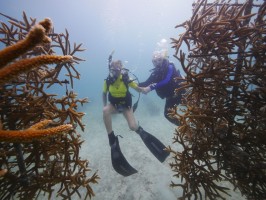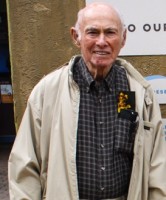Threatened coral reefs will have more powerful allies in the Florida Keys following the official opening of Mote Marine Laboratory’s International Center for Coral Reef Research & Restoration (IC2R3) on May 25 at Summerland Key, Florida.
The 19,000-square-foot facility will more than double Mote’s space for coral research and restoration efforts at its existing Summerland Key campus — one of five Mote sites in Florida — and provide an enhanced base of operations for collaborating scientists from around the world.
The new building will include the Alfred Goldstein Institute for Climate Change Studies, thanks to a generous donation from the Alfred and Ann Goldstein Foundation.
Gift funds will support Mote’s International Center for Coral Reef Research and Restoration infrastructure and the supporting studies on the impacts of climate change on coral reef ecosystems and restoration.
“As a longtime supporter of Mote, I am excited to support this new facility and the related research that will enhance Mote’s international presence and reputation,” Dr. Al Goldstein said. “The impact of the research housed at this institute will make a profound difference not only in the Florida Keys but around the world.”
The invitation-only, ribbon-cutting ceremony on May 25 will allow Mote scientists, trustees, supporters and community leaders to celebrate and explore Mote’s IC2R3 — a category-5 hurricane resistant facility with 30.1 kilowatt solar panels, a rainwater capture system and other eco-friendly features. The application process is under way to designate IC2R3 as the first LEED Gold facility in Monroe County.
Scientists at IC2R3 and its Goldstein Institute will advance coral reef research using: new seawater systems, raceways and experimental tanks for studying multiple reef species facing climate change impacts such as rising ocean temperatures and ocean acidification; molecular equipment to process and prepare samples for next generation sequencing and genomic analyses — for example, to find the best genetic strains of corals for reef restoration; microbial supplies for studying microscopic life forms that can help or harm coral reefs; a carbonate chemistry lab for ocean acidification research; and more. The facility offers classrooms and dormitories for visiting scientists and students.
“Our International Center for Coral Reef Research & Restoration is a major base of operations and a launching platform for global coral reef restoration that can be achieved in a decade or two, not centuries,” said Dr. Michael P. Crosby, Mote President & CEO. “We envision self-sustaining ‘rainforests of the sea’ once again within our lifetime, for our children’s future and beyond.”
Coral reefs are nicknamed “rainforests of the sea” because they support about 25 percent of marine life on Earth and provide $6.3 billion to Florida’s economy. However, some areas of Florida and the Caribbean have lost 50-80 percent of coral cover in the last three decades, and reefs have declined worldwide.
Mote scientists and their partners are elucidating strategies to stem coral declines and working to implement significant restoration, based on Mote’s innovative coral restoration technologies. For example, Mote scientists have: restored more than 20,000 corals to Florida’s reefs; developed a special restoration process to speed the recovery of slow-growing coral species; assessed multiple threats to corals and their interactions, including warming temperatures expected with climate change, ocean acidification and coral disease; and studied the impacts of potentially concerning organic compounds found in pesticides, plastics and other human-contributed sources.
The facility will not only benefit Mote research; it will also nourish local to international collaboration. Mote’s Summerland Key campus has historically hosted and supported the work of more than 150 scientists from 60 institutions around the world per year — including researchers with approximately $63 million in National Science Foundation grants since 2004. Mote’s IC2R3 will allow this number of scientists and students, and their vital impact, to grow significantly. For example, it will benefit a collaboration forged in 2016 by Mote and The Nature Conservancy geared toward long-term reef restoration at unprecedented scales in Florida and the Caribbean.
The vision for Mote’s IC2R3 was launched in 2010 when Dr. Michael P. Crosby visited Mote’s Summerland Key facilities shortly after joining Mote. The existing facilities were nearly half a century old. Construction of IC2R3 then became the sole brick-and-mortar project supported by the Lab’s comprehensive fundraising campaign Oceans of Opportunity — which raised more than $50 million in donor commitments to enhance Mote’s impact as a whole and wrapped up in fall 2016. Construction of Mote’s IC2R3 began with the February 2016 demolition of the old facilities.
The new IC2R3 construction, outfitting, and scientific infrastructure value about $7 million total. All support to-date has come from philanthropic giving. The following supporters have made major contributions toward Mote’s IC2R3 facility and its mission:
- The Gardener Foundation, the Founding Donor
- The Rick and Nancy Moskovitz Foundation
- Alfred and Ann Goldstein Foundation
- Elizabeth Moore
- Charles and Margery Barancik Foundation.
- Jane’s Trust Foundation
Support continues today, well beyond the completion of the campaign. Mote, an independent, nonprofit research institution, is exceedingly grateful for the generosity of engaged community members.
Be part of the next wave: Support competitive research grants available to Mote and others focused on Florida’s reefs by purchasing the Protect Our Reefs license plate for Florida drivers (www.motereefplate.com) or make a direct donation to Mote by visiting www.mote.org/support and selecting “Donations.”





